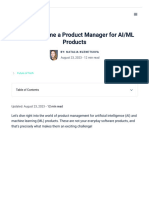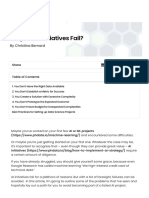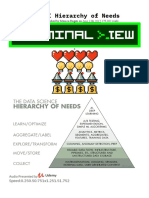0% found this document useful (0 votes)
20 views2 pagesAi Data Fundamentals
The AI Product Management training material emphasizes the critical role of data in AI systems, highlighting its impact on model quality and fairness. It covers essential aspects such as data collection, labeling, preprocessing, and the importance of collaboration with data scientists and MLOps engineers. A Data-Readiness Checklist is provided to help PMs assess data-related risks and ensure alignment among stakeholders.
Uploaded by
suchiwork2025Copyright
© © All Rights Reserved
We take content rights seriously. If you suspect this is your content, claim it here.
Available Formats
Download as PDF, TXT or read online on Scribd
0% found this document useful (0 votes)
20 views2 pagesAi Data Fundamentals
The AI Product Management training material emphasizes the critical role of data in AI systems, highlighting its impact on model quality and fairness. It covers essential aspects such as data collection, labeling, preprocessing, and the importance of collaboration with data scientists and MLOps engineers. A Data-Readiness Checklist is provided to help PMs assess data-related risks and ensure alignment among stakeholders.
Uploaded by
suchiwork2025Copyright
© © All Rights Reserved
We take content rights seriously. If you suspect this is your content, claim it here.
Available Formats
Download as PDF, TXT or read online on Scribd
/ 2


















































































